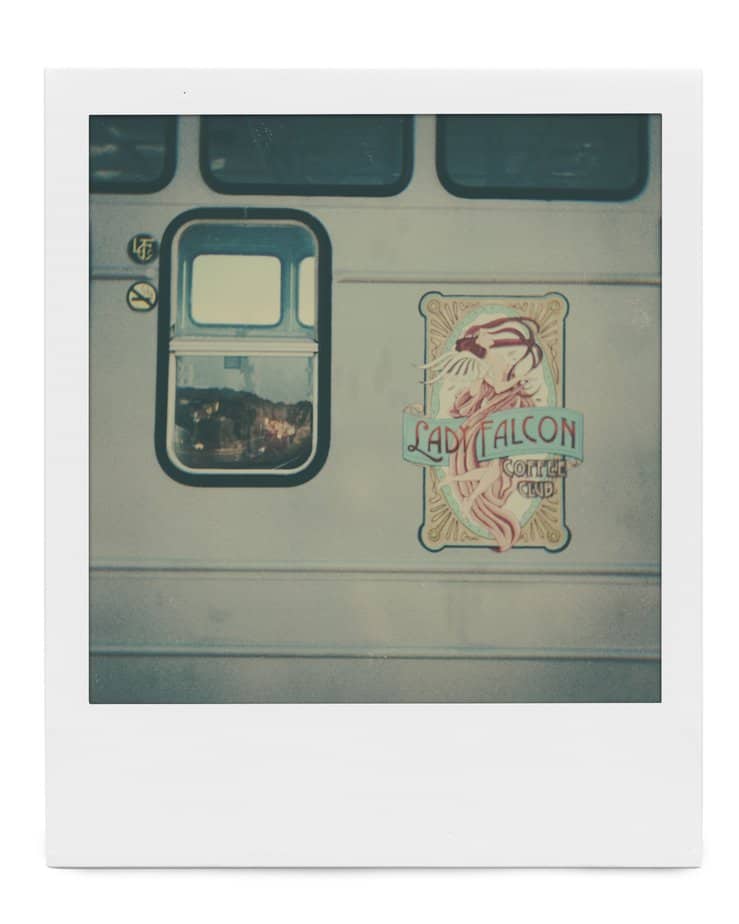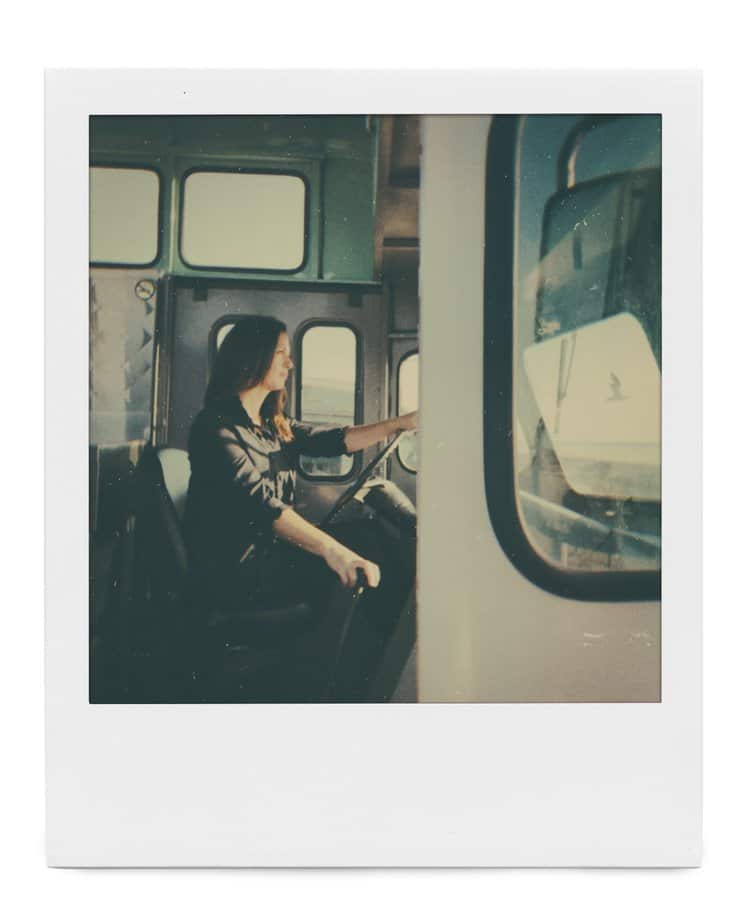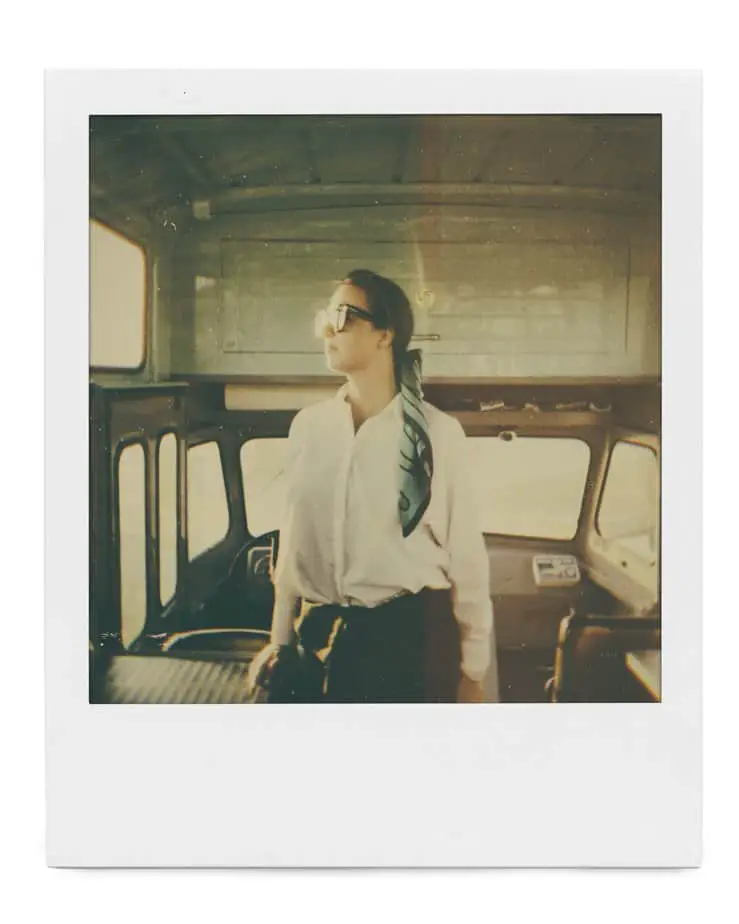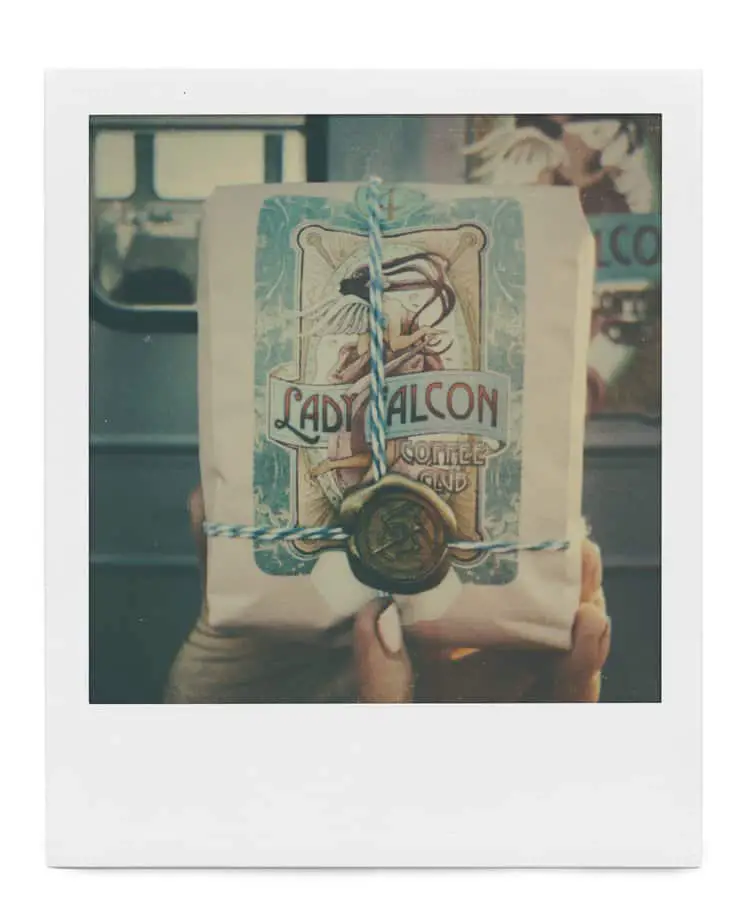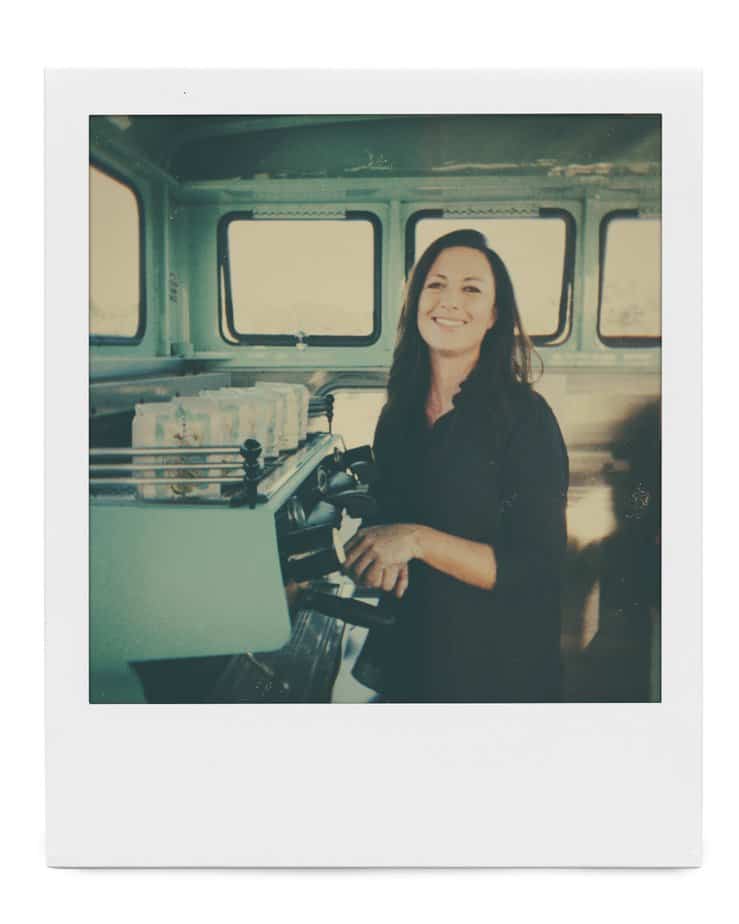Pink is your self-described “signature color.” Why that color?
When I was envisioning this coffee company, and envisioning how I wanted it to be different, I wanted to add something to the conversation focusing on specialty coffee. I started to look at what was going on in coffee, and I immediately noticed that all of the brands deemed “good coffee” were all the same — identical packaging in a brown bag with a rubber stamp. Every shelf looked exactly the same, the rubber stamp was slightly different, but that was it. My goal in envisioning this coffee company was really just to turn the whole coffee world on its head. This was an imaginary game I was playing in my head where there were no rules and I just wanted to add something to the conversation. It’s really important to me that I’m going to add something and it’s not going to be the same cookie cutter thing, because that doesn’t interest me. It’s been done. The part about the coffee world that I find so stifling is that the prism to coffee is so narrow and it’s based on what a few predominant men have deemed to be good coffee. I just wasn’t gonna win at their game. They had set up the rules to play so I thought well, “what if I just get to be me because I can win at being me.” I’m inherently very feminine and I love embracing my femininity. So what if I just made this pink which is, you know, sort of a quintessential feminine palette? That was my thought process and it’s really just owning how different we are from the rest of the coffee companies coffee out there. Owning it instead of trying to fit into their mold.
Last time we spoke, you mentioned going to school and finishing your bachelor’s and master’s degrees. How did you pivot from the world of academia to starting your own coffee company among numerous other businesses over the years?
I don’t know if there’s a short answer to that, it was like a drip in a bucket because I found it interesting. It’s been quite a fun and interesting ride, but I don’t know that I set out with a plan. It was very spontaneous and ad hoc. The importance to me was always on the culture that was created; the culture of communicating, hanging out, being by the beach. It’s not like the rest of the city and I wanted to preserve and cherish that and celebrate those things instead of try to be something we weren’t. So we started with the culture, and then it migrated into fine tuning different aspects. As my life evolved, I just grew very passionate about the coffee, the regions in which its grown, and the farmers who grow it. You can’t ever figure it all out. Coffee is endless. There are endless nuances. A lot of it isn’t actually written down. There’s not very many books about coffee. A lot of it is tactile learning. It became something I constantly revisited and the thing that I find so fascinating about coffee is that no matter how much I know, there is more to learn. I like the chase. I love the process of discovery.
So how did I pivot? Very slowly, very methodically over time. As many may know, my son passed away, and when something like that happens it creates a complete crisis in your life. From there, I had to reconfigure my life, so that everything I did, I liked doing. And I liked doing coffee. Coffee gathers people, it has a great culture of discourse. Where we are as a culture today, taking the time to sit and have a cup of coffee, by yourself or with friends or with your colleagues, it’s a wonderful practice in really being present with another person.
We’re becoming more disconnected and I believe that it’s an easy activity with no commitment and yet, the reward is huge. The information about coffee is intriguing to me, the culture of sitting down and exchanging and being present and being with either yourself or with a group setting. And it’s international. Everyone can sit and enjoy a cup of coffee.
Everyone has a personal ritual that goes along with it. My dad used to be the first one to get up, get out of the house, and go to a cafe to get a cup of coffee with all of the guys he used to hang out with. They would sit and joke around while enjoying their coffees and then when he was done, he would bring something home for us. That was his ritual and that’s how he would start his mornings. So everybody’s got a different thing but it’s how most of our world gets going. It’s also a really easy way to sit down with someone like “hey, let’s just get coffee.” It could be anything. You could sit down and have coffee and it can mean everything or it could mean not that much, but it’s a moment.
After meeting you and trying your coffee, I’ve had a really hard time going back to my usual Starbucks order and now it’s almost as if my eyes have been opened. After the first sip, I can sit back and say, “oh they burnt the espresso” or “the flavor profile is different in this one” and it’s nice being able to learn how to appreciate a good cup of coffee. It’s hard to go back because there’s a difference you can taste in Lady Falcon coffee, which goes to show the end result reflects your passion and level of dedication. There are so many layers and things you don’t experience when you drink commercial coffee. I gave some of your blends to family and friends who are notorious for their “specialty” drinks, and they came back to me and said this was the first time they were able to enjoy a cup of black coffee with nothing else in it.
Oh, that’s so sweet! It really is fun to create good coffee — to source great coffee, to go to the farms, to talk to the farmers, to see the towns and sourcing regions. It’s a big puzzle, but the taste is such an important element of it. That was one element in the third wave sweep that got a little confusing because people were roasting the coffee so light. They were so proud of the beans, but they were roasting it too light which just doesn’t taste as good. At least, that’s not my preferred taste profile. It’s just been really fun being able to create coffee that I love. It’s coffee that I know I can look forward to drinking in the morning because it’s so motivating.
What’s been the most rewarding moment that you’ve experienced, especially as a woman centric producer?
My most rewarding experiences is that my kids think it’s very ordinary. It’s rewarding seeing my sons watch this and knowing that they don’t know any different. They’re seeing women do these sorts of things more and more. My hope is that it’ll become so ordinary that it won’t be extraordinary. I just want them to know that their sister, their daughter, their mother, their spouse can do a lot of things and they’re not contained by one label, and that goes beyond being female. I think it’s bigger than gender.
What is one coffee order that you think everyone has to try in their lifetime or is there a certain blend or origin you would recommend?
I personally love Mexican coffees. I’ve just always loved Mexico. I think the coffee is fun and very flavorful and the different regions have experienced a lot of strife. Supporting our neighbors in that way, and being apart of something special, it’s fun. Over the years it’s become more established and I remember the first time I had it in Mexico and how I loved tasting it. I wanted to find out more and I had completed a lot of Latin American Studies in my undergraduate degree in political science. I had done a case study in the region where I ended up sourcing the coffee beans. I highly recommend Mexican beans; the one that we have right now is called “La Pluma.” I went to that region in Oaxaca, and it’s on the same equator line as the Jamaica Blue Mountain coffee. That’s very renowned and goes $100 a pound and since this is on the exact same equator line, it has a microclimate similar to the Jamaica Blue Mountain. So, of course it’s not $100 per pound, but it’s extraordinary and it’s such a trip to visit this farm. You go up really really really steep hills into the jungle and then on the other side of the mountain is the ocean. The ocean permeates this soil, which creates such a unique flavor.
I also highly recommend trying cascara, which is the husk of the coffee bean and has less caffeine. Scientifically it’s coffee, but it tastes nothing like coffee. It has a mellow buzz and you can taste this sweet, apricot and tobacco flavor. What I do is I get different cascaras, and I identify their taste profiles and then I blend them with something that will accent them. One of our really popular ones is the cascara hibiscus because I have this one cascara from Guatemala that’s very, very tart. And so combined with hibiscus, it’s just gorgeous. I highly recommend learning more about cascara and finding one that you like. I think it’s the next matcha and it’s really good for the coffee farmers because it creates a second revenue for them. Coffee farmers usually have just one revenue but having a second source is just so expanding for them. Cascara has a lot of wonderful attributes and has more antioxidants than acai. It’s a fun thing that I have a lot of joy learning more about and sharing with people for the first time.
Have you been able to find other like-minded women who are in the coffee industry in the city or a support system within the coffee community?
I don’t know if I found them, or if they found me but there was a group of us who were starting businesses right around the start of the #MeToo and Time’s Up movements and it was right as the 2016 election was settling in with people. We all sort of looked at each other and intuitively decided to support each other. It’s been really amazing. A lot of them are moms and it’s become a tribe. We all started around the same time and we’ve been going through the different cycles of everything. It’s become super collaborative and generous; it’s become everything you could hope for in a group of women.
Lady Falcon Coffee Club does a lot of collaborations with other local businesses and brands, so what is a local campaign, charity, or cause you would like to collaborate with in the future?
We do a lot of little things, but a lot of my personal donations go to 826 Valencia and Enterprise for You. I love what 826 does and I think they’ve put together an amazing team there. They started out before Valencia became “hip” and they have been putting in the time teaching kids to ensure they have the reading and writing skills to succeed in life. They focus on helping low-income students and making sure these are resources that will be available to them for free.
What would you say is the driving force behind your entrepreneurial spirit? Did you always know you wanted to follow your own path and start your own business or did you think you would go down a more “traditional” career path?
I think I was born this way. Both of my parents are entrepreneurs in their own right. My mom is a psychotherapist and my dad ran all of his own businesses. They never had a boss and so by definition, they were their own bosses. My mom really instilled in me that I needed to be my own boss and as a mother, it is a very helpful skill to be your own boss. She really drilled the concept into my head and my dad and grandfather taught me the nitty-gritty details of business. I started small businesses when I was in fourth grade, and I had little jobs I did around the neighborhood. I look at people who have other jobs and have sick days and that sounds really appealing but it’s not something I could do myself. Maybe one day I’ll work for someone, but everyone always works for somebody in the end. Even when you’re an entrepreneur, you’re working for somebody, because you’re working for your customers.
What’s one thing you want your family members to learn from your experience and what’s something you want them to be proud of?
The one thing I would like them to know is there’s just no harm in trying. Sometimes it doesn’t work out, but not trying is the bigger sin. Just throw your hat in there and do something. That’s what I want them to see: that I did it and gave it a good try. The thing that I want them to be most proud of is the fact that we give back, both in personal terms and in terms of the coffee company. My focus is primarily in the Ocean Beach neighborhood and right now I’m working on an art grant with one of the leading artists from the Minnesota Street Project. I also work with the city a lot to make sure the voices of those in the Outer Sunset are heard and to make sure the businesses in that neighborhood are successful as well. The neighborhood has been good to me and therefore I’m good to the neighborhood, or maybe I’m good to the neighborhood and it’s good to me. It’s hard to tell, it becomes so reciprocal. I don’t know where one ends and begins but that’s important to me. I think those are some of the projects I’m working on that my family will be proud of. I have my family out in the sunset, I have 29 nieces and nephews in the sunset. By giving back to the neighborhood, it’s for the next generation of people to enjoy it. It’s about making the world just a little bit better. Sometimes you get so caught up and it just becomes too big. I try to figure out ways to make the area really shine and show the creative spirit that has always been part of the neighborhood, harkening back to the name, Lady Falcon. It’s always been a place where artists and free thinkers and creatives have thrived. I think we can retain that and continue to make the neighborhood even better.
// Follow Lady Falcon Coffee Club on Instagram. ladyfalconcoffeeclub.com/shop; Photography by Simone Anne.
